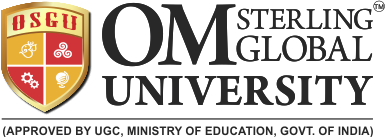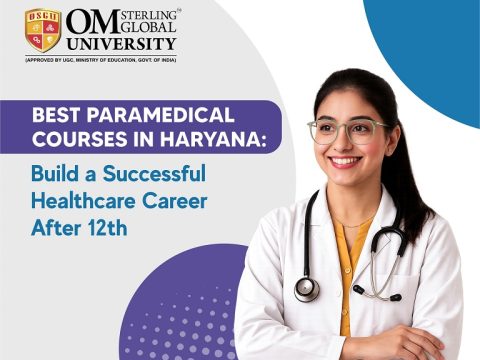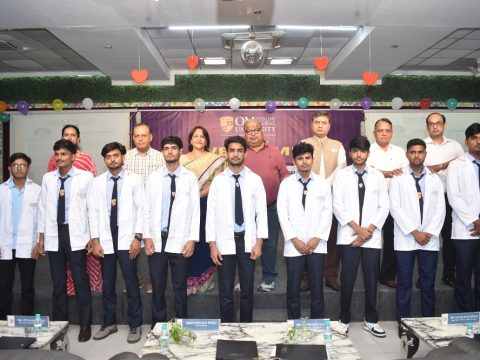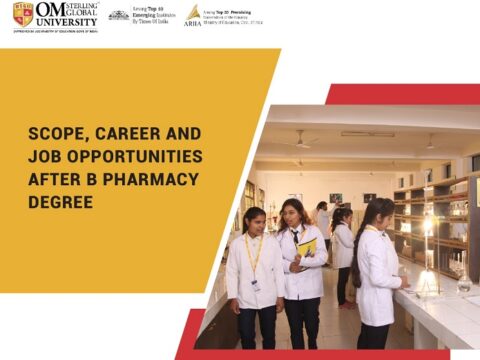-
Announcement : Admission Open Apply Now
 CONFERENCES 2026
CONFERENCES 2026  PhD. Admission 2026
PhD. Admission 2026 
Pharmacy Courses After 12th | Pharmacy Courses, Jobs, Salary, Scope & Career

International Women’s Day celebrated at Om Sterling Global University, Hisar
March 9, 2021
National Yoga Conference at Om Sterling Global University
April 14, 2021
A pharmacy course after 12th is a good career option for medical students. Students who don’t want to pursue MBBS or BDS can pursue B.Pharm or a Diploma in Pharmacy. The Indian pharmaceutical industry is growing rapidly, so the demand for pharmacy professionals is increasing daily.
There are many specialized pharmacy courses offered in this industry, and is a consistent need for skilled professionals in this area. If you’re considering entering this field, you can proceed without hesitation. Just go with pharmacy degree courses today.
The role of a pharmacist is to provide medicine or drugs as prescribed by a certified medical professional. Pharmacists in pharmaceutical companies are involved in operations like manufacturing, supply, quality assessment, and drug auditing.
Types of Pharmacy Courses
Candidates who want to pursue pharmacy must have completed their 12th with PCB or PCM. After the 12th, one can pursue the following course:
Here are a few different types of pharmacy courses:
| Name of Course | Duration | Type |
| Diploma in Pharmacy | 2 Years | Diploma |
| B.Pharm | 4 Years | Degree |
| Pharm D | 6 Years | Doctorate |
Here is a detailed pharmacy course list:

Diploma in Pharmacy (D.Pharm)
A two-year diploma program in pharmacy covers the general responsibilities of pharmacists. This course is preferred by students who wish to gain more real-world experience and prepare for employment. However, having a shorter course duration than a B.Pharm.
The eligibility of D. Pharma is that, generally needs to have passed your 10+2 (or equivalent) examination in a science stream with Physics, Chemistry, and either Biology or Mathematics, and achieve a minimum aggregate score, typically around 50%.
Bachelor of Pharmacy (B. Pharm)
Bachelor of Pharmacy is the best pharmacy course after 12th, and the B Pharmacy duration in india is 4 years. B Pharm covers human anatomy and how different medications affect the body. The curriculum combines academic understanding with a practical approach.
After graduation, one can go for higher studies in this field for post-graduation pharmacy courses.
Master’s in Pharmacy (M.Pharm)
A Master of Pharmacy (M.Pharm) is a postgraduate degree in pharmacy, typically a 2-year program, offering in-depth knowledge and research skills in areas like drug formulation, development, and evaluation.
Doctorate in Pharmacy (Pharm.D)
The six-year Doctor of Pharmacy program consists of one year of internship and five years of education. Pharm D candidates are those who wish to learn and succeed in the pharma sector. There are many different jobs available to students who finish Pharma D, including those for pharmacists, quality assurance managers, and research scientists.
B Pharma and D Pharma Difference

Pharma (Bachelor of Pharmacy) is a 4-year degree offering in-depth knowledge of pharmaceutical sciences, while D. Pharma (Diploma in Pharmacy) is a 2-year diploma focusing on foundational pharmacy skills for entry-level roles.
Here’s a more detailed comparison:
| Features | B. Pharma | D Pharma |
| Duration | 4 Years | 2 Years |
| Focus | Comprehensive knowledge of pharmaceutical sciences, including drug formulation, medicinal chemistry, and pharmacology | Basic pharmaceutical sciences and practical skills for pharmacy settings |
| Career Paths | Pharmacist, researcher, industry professional, quality control, drug development, management roles | Pharmacy technician, dispenser, pharmacy assistant |
| Course Content | Wider range of subjects, including biochemistry, pharmacology, pharmaceutics, and industrial pharmacy. | Focus on basic principles of pharmacy and practical skills. |
| Entry into Workforce | Requires more time for education, but opens doors to diverse career paths | Faster entry into the workforce, ideal for those seeking immediate employment |
Pharmacy Course Eligibility
For admission to pharmacy courses after 12th, candidates must meet the basic eligibility guidelines given below:
- Passed 10+2 (PCM) or (PCB) from any recognized board or university.
- Must score a minimum of 45% marks in qualifying subjects.
- The candidate must have completed at least 17 years of age at the time of taking admission.
These three pointers are mandatory in pharmacy course eligibility and pharmacy course requirements.
Common entrance examinations used for admissions include the National Eligibility cum Entrance Test (NEET), University-Specific Entrance examinations, State-Level Common Entrance Tests (CETs), AP EAMCET, GPAT, and WBJEE.
Fees of Pharmacy Courses
Depending on the university, these pharmacy courses after 12th have different fee ranges. Sp. for further assistance, call +91 8607899999 now!
Admission Process of Pharmacy Courses
The university you are applying to will decide on the admissions procedure. The university further sets the cut-off or entrance exam. While some universities also have their tests, some states have their own.
Here is a brief about the admission process for pharmacy courses, are:
- The admission to the pharmacy courses is based on a state-level entrance exam conducted by the state medical authority.
- Some universities also offer admission based on 12th marks.
- For PG courses, candidates have to qualify pharmacy aptitude test conducted at the national level, known as GPAT.
- The GPAT exam is conducted by NTA; the application form for the same is available from the first week of November every year.
- After qualifying for the exam, candidates have to appear in the counselling process.
Pharmacy Jobs and Salary in India
The scope of Pharmacy is huge in India & abroad. The pharmaceutical sector requires skilled professionals to cope with the growing demand for medicines & drugs required by healthcare units.

Following your pharmacy qualification, your initial pay might range from ₹2.5 lakh to ₹4 lakh annually. As you become more skilled and knowledgeable in your industry, your pay will continuously rise.
As a pharmacy degree holder you can work in Pharma companies, as a tutor, as an independent certified pharmacy store manager etc. therefore the opportunities are immense in this field, now one can become a pharmacist by doing a degree or a diploma level course, you can check about the courses in the below section.
Brief Presentation of Pharmacy Jobs and Salary in India
Job Roles |
Average Salary |
| Pharmacist | Rs. 2.8 LPA |
| QC Inspector | Rs. 2.8 LPA |
| Research Associate | Rs. 4.7 LPA |
| Drug Inspector | Rs. 4.9 LPA |
| Chemist | Rs. 3.1 LPA |
| Teacher | Rs. 2.8 LPA |
Note: These are the average salaries with relevant job roles. (Just for educational purposes only).
Source: Ambition Box
Career After Pharmacy Courses
There are many pharmacy student jobs in India, where a pharmacy student can build their career in this industry.
Entering this sector allows you to pursue a variety of career options and shape your future in the path that most appeals to you. These are a few of the most popular positions that graduates choose to pursue.

Here is the list of a few pharmacy student jobs:
- Chemist
- Pharmacist
- Food Analyst
- Health Inspector
- Research Associate
- Medical Representative
- Quality Control Executive
- Quality Assurance Executive
- Universities/Colleges Educator
- Pharmacy Shop/Store Manager or Owner
- Pharmacy Professional in Hospitals & Nursing Care
Last Words
There are many chances in the extremely profitable profession of pharmacy; how you choose to pursue it is up to you. Before enrolling in the pharmacy degree courses, weigh all the factors. By selecting Pharmacy Courses & Programs, you may view the list of the best pharmacy schools and customize the course to meet your needs.
FAQ Related to Pharmacy Courses After 12th
What is pharmacy course?
A pharmacy course is an academic program that teaches students about medicines, healthcare, and drug development. Pharmacy courses can prepare students for careers in healthcare, research, and academia.
Pharmacy courses include clinical research and study alongside academic and practical training. Students gain knowledge of illnesses, drug groupings, and how the chemicals in prescription drugs affect the body.
What are the core subjects covered in pharmacy courses after 12th?
The most common subjects in pharmacy courses after 12th are Pharmacology, pharmaceutics, pharmaceutical chemistry, biochemistry, and other topics are covered in BPharm courses.
What are the pharmacist’s qualifications?
To become a registered pharmacist in India, you typically need to complete a Bachelor of Pharmacy (B. Pharm) degree or a Doctor of Pharmacy (Pharm.D) degree, followed by registration with the Pharmacy Council of India (PCI).
Which degree is required to open a medical store?
In India, you must have a Bachelor of Pharmacy (B. Pharm) or a Diploma in Pharmacy (D. Pharm) from a recognised college to start a medical shop/store as the owner or an assigned pharmacist.
What are the best career options after 12th science?
After the completion of the 12th with science. You can pursue your career in B Pharmacy. As the demand of the pharmaceutical industry is rising, you have a great opportunity to build your career in this sector.
Which university is best for B. Pharm?
Om Sterling Global University is a leading university that provides pharmacy degree courses in India. OSGU has a pharmacy college named the School of Pharmaceutical Sciences.
Can I pursue pharmacy after 12th PCB?
Yes, you can pursue pharmacy (B. Pharm) after completing 12th with Physics, Chemistry, and Biology (PCB) as your subjects.



